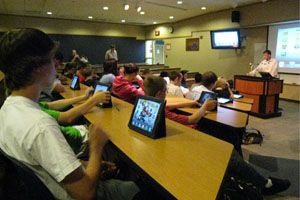“It’s absolutely ridiculous.” “Why the freshmen?” “Why on earth does anyone need an iPad? Let’s all just get laptops.”
There could be a full page of “Heard in the Halls” just on the newest hot topic at our school: The iPad Pilot. Significant noise has been made over this pilot, but looking into it, few students actually know what is going on.
Assistant Principal Mr. Adam Ehrmantraut explained how 1-device to 1-student computing has been a district goal since 2006. The specific device was not decided until late last school year, iPads were chosen because of their benefits in a school setting: A 12-to-15-hour battery life, Apple’s trademark ease of use and accessibility, and success with using iPads in the elementary schools.
Why freshmen? Mr. Ehrmantraut said that it was easy to find a core group of around 300 students who have similar schedules, the same teachers, and are spread throughout general and accelerated courses. After ninth grade, there are more class options, and it becomes impossible to find a large enough group who all take the same classes to receive legitimate results.
Actual use of iPads for school purposes has been questioned—why not use e-readers? But iPad’s surprisingly more versatile and functional than e-readers. Ms. Martinson, 9X English teacher, showed how electronic post-it notes and highlighted text get stored on a special page on iBook, so students can easily keep track of significant passages and type why they are significant right next to the text. In addition, an app called Noterize lets students download documents from Schoology, write or type on the downloaded document, then import it back to a teacher’s Schoology dropbox. Using this process, homework and classwork can become paperless. iPad’s also have a complete scientific calculator, access to dictionaries, thesauri, and a math glossary. Ms. Wiitala, Higher Algebra 9 teacher, said that she hopes iPads can replace finicky Senteos, while Mr. Surver, math teacher not part of the pilot, hopes that iPads can be used in math classes to look up real-world data, instead of teachers making data up for problems.
At the conclusion of the interview, Ehrmantraut said that the iPad Pilot “is not a finished product at all, this is a pilot. We are going to learn as we go.” He said, “We have fundamentals in place, but integration into the curriculum will evolve as we go.” Ms. Martinson also said that the iPad pilot will be a learning process for teachers and students. But she also noted how students have, so far, been much more engaged in class with the iPad.
iPads have the potential to open up a completely new world of learning for students, one that is much smoother and familiar to people raised in our digital age. Let’s give this pilot a chance, and see where it takes the school, before shutting it down out of jealousy or bitterness. If it is a success, an iPad might be in your hands sooner than you think.































